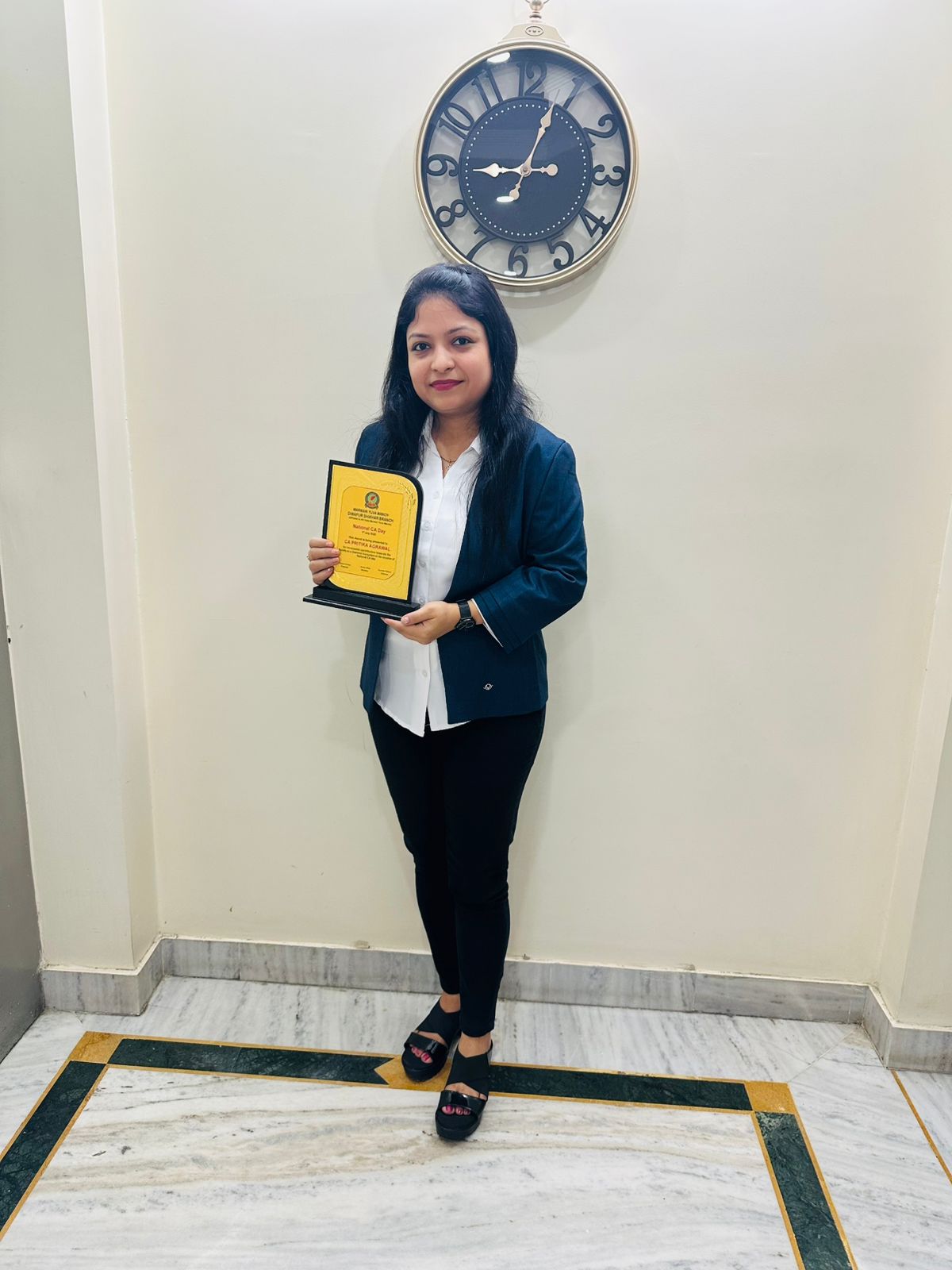CA Pritika Agarwalla Jain shares insights from her professional journey to guide aspiring CAs in Nagaland.
Share

DIMAPUR — CA Pritika Agarwalla Jain harboured a desire from an early age to carve out a distinct identity—one that would allow her to make a meaningful impact and be recognised for her expertise.
She secured 20th position in her HSSLC exam and completed her graduation in Commerce from Delhi University. In 2015, she earned her Chartered Accountant (CA) degree and subsequently qualified for a Diploma in Information Systems Audit (DISA). She has now been practising the profession for ten years.
She is the proprietor of the Chartered Accountancy firm M/S Pritika & Associates, located at Marwari Patty, near Jain Temple. With a decade of experience, she has witnessed firsthand the challenges and successes that come with pursuing this profession.
In an interview with Eastern Mirror, she shares insights, practical guidance, and lessons from her career to help aspiring CAs make informed decisions and excel in their professional journey.
For students hearing the term for the first time, what exactly does a Chartered Accountant do?
A Chartered Accountant (CA) plays a vital role in the financial world, offering expertise in accounting, taxation, auditing, and business advisory. From salaried employees, professionals, and small business owners to the largest business tycoons, all require the services of a CA. From private corporate units to public sector undertakings (PSUs) and all nationalised and private banks, all need to have their books of accounts verified by a CA. In today’s world, the role of a CA is not specific but diversified, and it is so vital that everyone sooner or later has to use the services of a CA.
Also read: Turning pet passion into profession: Insights from a local entrepreneur
In the words of our former President, Dr. APJ Abdul Kalam, “Chartered accountants are partners in nation building”.
What services does Pritika & Associates provide, and how do they help local businesses?
Not just businesses; we help salaried employees, pensioners, professionals, business owners, and societies file their income tax returns, handle income tax notices, and prepare documents for car loans, home loans, and other financial consultancy.
For businesses in particular, we assist in preparing financial statements, filing GST returns, conducting income tax and GST audits, preparing project reports for business loans, incorporating a company or limited liability partnership (LLP), and more. Our motto is simple—our growth lies in the growth of our clients. So your progress is our purpose.
Could you outline the step-by-step route to earning the CA qualification in India?

After completing Class 12 (in any stream, though Commerce is preferred), you can register with the Institute of Chartered Accountants of India (ICAI) for the Foundation course. The Foundation exams are now held three times in a year.
Once you pass the Foundation exam, you can enrol in the CA Intermediate course. Alternatively, if you have completed your graduation, you can skip the Foundation level and gain direct entry to the Intermediate level. Commerce students must secure at least 55% in graduation, while students from science or other streams need more than 60% to obtain direct entry to the Intermediate course. This level is divided into two groups. You can attempt one or both groups at a time.
After clearing at least one group of CA Intermediate exams, you will be eligible to complete four weeks of Information Technology Training (ITT) and Orientation Training (OT).
After the ITT and OT training, you need to begin your articleship training. This involves practical training under a practising CA for three years. This is the most important phase of the CA course journey. While the course is extensive and the exams highly competitive, this training shapes a competent CA. During the training, you gain practical exposure to real-life client issues.
After completing 2.5 years of training, you can attempt the CA Finals examination. There are two groups in CA Finals as well. You can attempt one or both groups at a time.
Once you have passed the Final exams and completed three years of practical training, you can become a member of ICAI. If you want to practise as a CA, you must apply for a Certificate of Practice (COP). For service sectors like corporate work or banks, a COP is not required.
Which school subjects in classes 9 to 12 best prepare students for the CA journey?
In every class, Mathematics is one of the most important subjects for students. Not just for CA, but in everyday life, Maths plays a very important role. Nowadays, I have come to know that after Class 12, Maths has become an alternative subject. But students should keep in mind that there is no subject greater than Maths, whichever field you choose. Besides that, accounts and taxation are particularly important subjects for the CA course.
What study resources are available in Nagaland for the CA Foundation course?
In the age of digital media, it is not the place but the determination of students that matters. There are numerous top-level coaching centres offering online classes, pendrive classes, and study materials. All you need is good WiFi and a laptop or computer. Once you enrol for the course, ICAI sends its study materials to your address free of cost.
Many students worry about the CA pass rate. How did you keep yourself motivated through repeated exams? How much time each day should a student realistically set aside for CA preparation?
The CA journey is undeniably intense, and the pass rates can feel daunting, but discipline, grit, and a sense of purpose can help you achieve whatever you desire.
Always remember, the sweetest fruit isn’t found on the roadside. You have to climb the tree and pluck it. This is what keeps you motivated — “the fruit of your hard work”.
Every competitive exam is tough to crack, but the tougher the exam, the higher the reward. As quoted by our Prime Minister, Narendra Modi, “A CA’s signature is more important than that of a PM.” When your signature holds such power and respect, you really need to work hard and earn it.
How can students from Nagaland secure good placements, either locally or in bigger cities?

The population of India as of 2024 is approximately 1.41 billion, and the total number of CAs serving in the country as of 2025 is just 4,07,629. You can see a stark difference here. In today’s world, who does not need help with their finances? So, if you are hard-working, there is no shortage of placements.
Even ICAI conducts campus placement programmes twice a year with top recruiters like Deloitte, Ernst & Young (EY), Klynveld Peat Marwick Goerdeler (KPMG), and more. The latest round saw 241 companies offering over 4,700 jobs, with salaries up to INR 26.7 lakh per annum. The CA course covers accounts, taxation, audit, company affairs, product costing, financial market study, foreign taxation, and insolvency and bankruptcy study. So, basically, a CA can fit into numerous roles according to their specialisation.
In the corporate sector, CA candidates are highly sought after compared to their counterparts. In private practice, a CA can open an office even in a village with a decent population and secure a good number of clients.
Nagaland is currently developing, and the demand for good professionals is increasing daily. As a woman CA practising here, I can say from firsthand experience that Nagaland is an icon of equality. Nagaland may have some internal issues (as every state does), yet the respect people here hold for professionals, especially women, is commendable.
What opportunities exist for CAs in government departments or public-sector undertakings in the region?
While Nagaland has fewer PSUs compared to larger states, CAs can find roles in the Nagaland Industrial Development Corporation (NIDC) for finance and internal audit. Nagaland State Transport, the Power Department, and Nagaland State Co-operative Bank appoint CAs for financial oversight and compliance. North Eastern Electric Power Corporation (NEEPCO), Bharat Sanchar Nigam Limited (BSNL), Indian Oil Corporation, and Oil India Ltd., which operate regionally, recruit CAs for finance and audit roles.
Looking back, what was the most challenging point in your career, and what lesson did it teach you?
The most challenging point in my career, I think, was when I first had to say, “I don’t know.” I passed my exams in 2015. That was the era of VAT. In July 2017, the GST Act was launched, and it was new for everyone, even for CAs who are considered experts in the field. But that moment taught me the most important lesson: all you need to do is ASK (Always Seek Knowledge).
It taught me that not knowing isn’t a dead end — it’s a launchpad. Every year, the budget brings new bills, enactments, and amendments to existing acts. Every case law judgement brings a new perspective to an act. A good professional is one who can keep up with the changing environment, keep building and enhancing their knowledge, and yet be humble enough.
Which myth about CAs would you wish to break?

One of the biggest myths I’d like to break is that CAs just crunch numbers. I would like to introduce five famous people you may not know were also CAs: Kumar Mangalam Birla, Chairman of the Aditya Birla Group, one of the biggest conglomerates in the country; Piyush Goel, Minister of Power, Coal, and New and Renewable Energy for the Government of India; the late Rakesh Jhunjhunwala, known as the Indian Warren Buffet; Deepak Parekh, Chairman of HDFC; and Shekhar Kapur, a critically acclaimed film director in Bollywood.
Having a CA degree does not mean you have to practise only in audit and taxation. This degree helps you in every career you pursue. This isn’t just about passing exams or landing jobs. It’s about building character, resilience, and vision. The CA journey shapes not just what you will do, but who you will become.